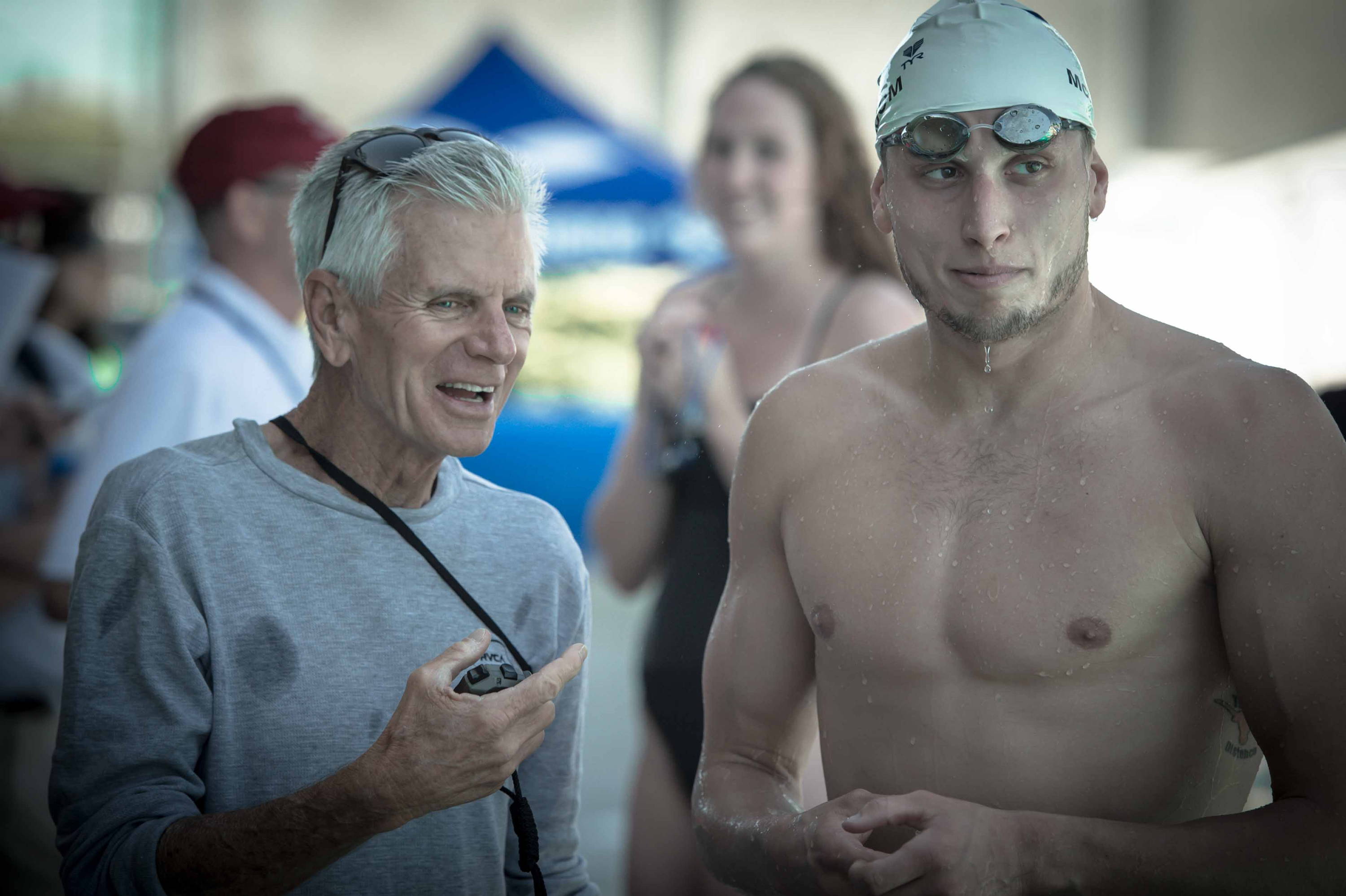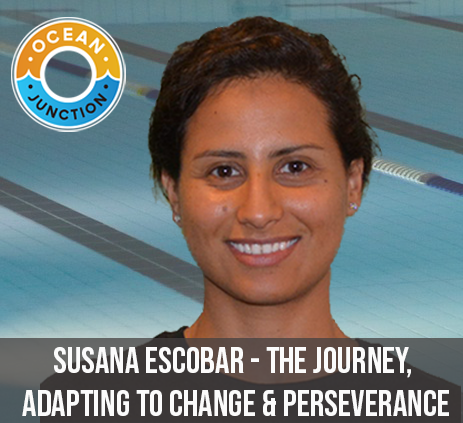Morning folks, and welcome to the on-deck show. A show that takes a look at people and organizations doing things and operating outside the normal scope to make things better for folks like you and I. Today, we have the pleasure of speaking with Suzanne Escobar from the 2008 Mexican Olympic team graduate of the University of Texas in Austin, NCAA swimmer currently resides in Ontario as the co-head coach of the Tri-Hart triathlon club today, we're going to speak to Susanna. This is going to be the first in a multi-part series where we talk about tips for training this summer, bringing her expertise as a swimmer and what she's doing in her home-based swim business. We welcome Susanna.
The text that follows is an unedited excerpt from our hour long conversation. The full video interview can be found on our youtube channel and by the link here. The full audio can be found by vis the Spotify link below
All right. Good morning, Susanna.
Good morning, Jason. Thank you so much for the introduction. That was lovely.
My pleasure. And you know, just, just simply a resume of, you know, things you've done and we're going to dive a little bit more deeply into that, um, in the early parts of this episode, but I want to spend the time, the majority of the time talking about the home-based business. You have, you've developed with your husband Lee and, talk about some tips for the summer and people listening and, and whatnot. And then, from that point forward, um, I'm hoping maybe we can arrange a quick tour of your swim area. Okay. Perfect. Um, so just to set the stage and give people some context to understand, you know, like sort of your journey and whatnot.
So you're originally from Mexico, the prime motivation for you, yourself getting into swimming was a near-drowning accident. Is that correct?
That's that's correct. Yes. Um, I would have been maybefour. I, I don't remember the incident, but, um, my mom does; I've always lovedthe water, like, and I, you know, always going to pools that more shallowenough so that I would be safe. I didn't know how to swim. We were on vacation,and sure enough, I jumped into the hotel pool, but that was a little bit toodeep for me; I was having a hard time, I went under, and my sister jumped in,got me out.
And then from then on, my mom's like, okay, well, we're notgoing to go anywhere unless everybody knows how to swim. So my three oldersiblings already knew how to swim. They're already in swim lessons, but theyounger three words. So since then, uh, all six of us kind of got into it, andyeah, the rest is history, right?
Fair enough.
And it, that, that piece of information that sort of times,well, cause we're in the midst of a drowning prevention series that we're alsorunning. So very important message in terms of, you know, like the need forswimming lessons and so on and so forth. Now you've had the fortunate experience to swim in Mexico, the USA andin Canada.
Tell me a bit of the swimming environment in each of thosecountries.
Oh, yes. Uh, that's an excellent question; we can talk aboutthat for hours. I'm just going to get to the point. It's very,very different than, you know what, it's no wonder, you know, the US is the numberone globally, the resources in the United States are overwhelming. In Mexico,like growing up there, uh, there were many challenges, right. Um, there, so ourhistory as a family is quite rich, we had to move from one city to the next,um, you know, my parents had built a swim club from the ground because theywere just not seeing eye to eye with the head coach at the time. I was very young when this happened 9 or 10years old; I remember vividly how my parents were very active with thecommunity members, especially on the swim club. They talked about how thingscould be better. And they not only were talking to talk, but they walked thewalk where, you know, they recruited the parents who aligned with theirbeliefs. They drew up a plan and started their swim club; it was pretty impressive.They recruited a coach from Cuba at the time; swimming and just sports in Cuba arepretty strong. They've been very, very smart. So they brought in a coach fromCuba; he started teaching my sister, who is now head coach up in the Yukon with the WhitehorseGlacier Bears.
She started at 16, and that's how we began to get a glimpseinto high-performance swimming and training. It was always a struggle; there was always something, and there's a lotof politics in play there. I remember atime with a swim club that we were swimming with dissolved due to challengingconditions. We had to move to anothercity to keep finding ways to training and find pool time and swim coaches &resources; we ended up moving three times before I was 12 in [pursuit ofswimming. I was always the new kid at school because I was going to differentcities. I recall a point in time where peoplejust were not happy that we were taking too much pool time for training, and Iwas physically pushed out of the building. And that's just an example of how itwas to just get good high performance or just performance swim club back in,back in Mexico, especially in the city and in the region.
The focus was high on health and fitness, which is excellent,but there's very little focus and attention on youth sports. Ithink sports in general, swimming I love. But, still, sports in general, it'sjust a great gateway for youth to grow, you know, to, you know, get them tolearn, teach discipline and you know, all these virtues and values that aregoing to be good throughout life.
It was tough to get them to see back in Mexico at that time.So my journey, you know, and the first early in life, you know, my teenageearly teenage and mid-teenage years were very difficult. It wasn't up until I was about 16 during highschools, like grade 11 or something like that, there was a huge boom and thecenter of the country, at a swimming training center; it's more like a health club, but thefacilities are phenomenal. So you have 50-meter pool, you have the track, youhave your tennis courts, everything. And they brought in an American coach. InMexico, we have this thought that when it's somebody else other than a Mexicancoach comes, they must be better. It's an idea that still kind of haunts us tothis day, but that's another story. So anyway, he came in. His name is Jack Roach, widely knownin the United States.
We heard about it. We thought it was the best choice at thetime.
We wanted to get somewhere in swimming; we went there and started training with Jack, and it was, it was great; it was a great push. There were a lot of swimmers that Jack drew into that team. The competition day in day out was phenomenal. I improved a lot., it was my first time being in a virtual team because before that it was just family; It was just my sisters and myself getting me the workouts. Performance pushes you to do your best every day.
Coach Jack Roach in the adjacent photo

So, how did the USA augment that for you? Did you go from Mexico to the US or did youcome to Canada first?
So, because I was training with Jack, he would take us tothe United States to race. I was utterly oblivious that I could, as a swimmer,go to university and represent a university at the same time while getting anexcellent education and do both at a hundred percent like without compromising.
Unfortunately, you don't have that possibility back inMexico; for 90% of the swimmers, they have to decide once they graduate highschool, continue swimming, or just pursue their education.
And this is going back to; we don't, we can't pay attentionto that youth, recreation, youth sports and youth performance, because as anexample in high school, I had a teacher that said, well, you know, it's gettingtough. So you're going to have to decide at some point whether you want to swimor you want to be a student.
That's the reality. We have so much talent in Mexico, butkids just can't pursue as much as they should or much of that one because theyhave to compromise.
Would it Be fair to say that they're told they have tochoose one or the other rather than meet the challenge?
I was told you're going to have to choose swimming or ourschool. I was told. So they're going to pick school because they can't make aliving out of swimming. So I just spent like, I best focus my efforts into theschool.
Sorry. I want to interrupt you there; just a follow-upquestion to what you said. To dig alittle bit deeper on that point. So you're not going to make a living out ofswimming, but what you do get, you know, through the journey you took was a lotof experience.
Oh, absolutely.
You're not, you're not going to make a living yet. But theexperience that you're going to live, you know, will help shape and help youunderstand what you might enjoy down the line that you can make a living at.
It's great that you bring up that point that's how we think;we appreciate what sports do for a person. I vividly remember times where mymom was fighting with my uncles, but you know, it's neither here nor there. Thepoint is that there are a lot of parents who just don't see it that way. Theymay believe they are wasting too much time;, you're not going to get, you'renot going to get to the Olympics, and retreat to the idea to go to school and just forget about swimmingand that's usually how it works.

